#Tune in
Text
Ivan Vaughan writes about John and Paul
This is just a relatively brief excerpt from Ivan Vaughan's book, which, for the most part, focuses on his life with Parkinson's disease. (From what I can tell so far, it's absolutely fascinating: far more than 'simply' a memoir, it's a reflection on illness, the mind-body connection, science, psychotropic drugs, patients' autonomy...and much more.)
But since this blog is climbing the drainpipe to the John & Paul business, and there's been some recent discussion of Mark Lewisohn's claim that John was such a bad boy Ivan's mother sent her son to a different grammar school to separate the two, I thought the following might be interesting.
And the ending of this chapter also gives some context to Paul's reaction to John's murder—another topic about which ML has interesting opinions.
This isn't to pile on ML, but more...as words from someone who was there.
(CC: @mythserene, @anotherkindofmindpod)
I met John when I was three or four years old. One wet morning there was a knock at the front door. My mother opened it, and looking down, found a boy a bit older than me, smiling, but preoccupied with the effort of remembering what he had been rehearsed to say.
‘I believe a little boy lives here. I wondered if you might like to come out and play.’ He stood there in the porch, rain pouring down behind him, with a pair of slippers under his arm.
‘Come on in. What’s your name? You live round the corner don’t you?’
Next day I went around to the house where he lived with his aunt and uncle. We played with Dinky cars. I was surprised by his generosity and willingness to share his toys; he was happy even for me to take some of them home. When his Uncle George came home with some sweets John readily shared them. There was an immediate bond between us. He was older, read books, and his great intelligence and experience were apparent. I accepted his leadership but I was determined to preserve my independence. From the warm security of Aunt Mimi’s control, John accepted me into his life.
John was a member of his local library and immersed himself in books so that by the age of five he was already a fluent reader. I was still in the infant school when he started at Dovedale Road Primary School, but we played together after school and weekends. There were numerous parks, a golf course, and fields full of tangled growth and trees — just right for playing cowboys and Indians. In one barren area with large lumps of hard earth we played football and cricket. We spent hours digging all tracks to race our Dinky cars. Our most exciting game, though, was ‘fires’. We would go to a large area of waste ground and simply set fire to the straw and watch the place. I have never understood why nobody stopped us.
John’s gang comprised, besides himself, Pete Shotton, Nigel Wally and me. I was the youngest and was constantly having to prove my worth. I feel privileged to be John’s friend since he was nearly two years older. He protected me against Timmy Tarbuck and his gang on the rare occasions when I made the mistake of confronting one of them.
John and I went to different grammar schools, but I used to hear about the chaos and riots that seem to be a daily feature of his schooling. I’d rather lost touch with him when I went to university, and did not see him again until sometime after I was married. Then one day, as I was playing with my little boy Jus on the steps of our house in London, white Rolls Royce turned into the road. John jumped out followed by a woman I have not met before.
‘Hello, Ivy! This is Yoko.’ (…)
My attachment to both John and Paul ran deep and occasionally I would go to great lengths in order to see them at a moment’s notice. Maybe Paul saw our continuing friendship as a way of maintaining simple values he held dear. Jan liked Paul, though she did not see much of John. She was not the least bit mesmerized by their fame. She enjoyed eating at expensive restaurants in sampling London’s nightlife, into which Paul took us from time to time. But, should the effort to come to great, she was willing to let the relationship fade.
A month after telephoning John in New York [with the news of the Parkinson’s diagnosis; their first conversation in years], a heavy parcel was delivered. It was not until I was reading the titles of the books it contained that I realized they had been sent by John and Yoko. There was one by Arthur Janov, author of the Primal Scream, and one entitled Mind Magic. How to Get Well had on the fly-leaf a message from John that read ‘to start looking’, and The Snow Leopard had a note saying ‘to relax’. This last book gave me the greatest pleasure and I frequently re-read passages from it. Its author, Peter Matthiesen, lost his son through illness and journeyed in Nepal and in Inner Dolpo on a completely pointless journey to catch sight of a snow leopard. The peace he found travels across to the reader from each page.
John’s accompanying letter urged me, in punning language, to keep my spirits high and strongly suggested that it was up to me whether I sank or swam. I must not lose faith in myself.
Ten weeks later he was shot dead. Paul and I did not contact each other about it; in fact, we never brought it up in conversation. I hardly reacted outwardly at all. The day after John’s death, however, a colleague said that he supposed I was very upset at what it happened. I heard myself say: ‘I don’t know what I feel. I don’t know that I feel much at all’. As soon as he had gone, I instinctively made my way to a room where I knew I could be alone, and I wept profusely.
-- from Ivan-Living with Parkinson's Disease by Ivan Vaughan. 1986.
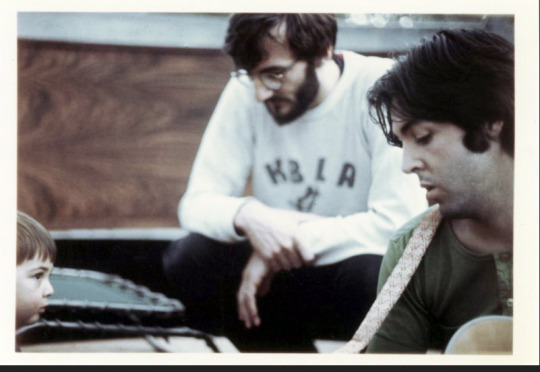
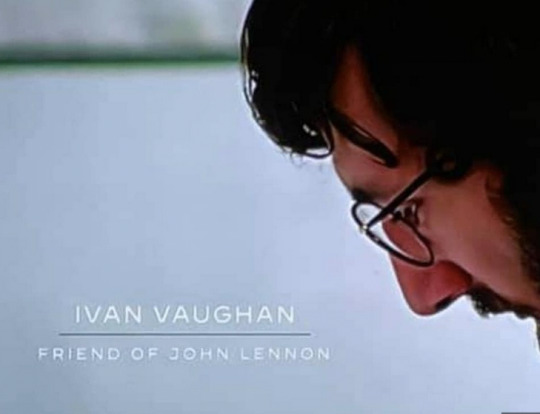
#John's warmth and sweetness come through in Ivan's memories despite the sporadic nature of their later friendship#Interesting point about Paul's constancy and the 'simple values he held dear'#The ending kills me#That's the men they were#despite the Summer of Love and stuff...#Ivan Vaughan#paul mccartney#John Lennon#(LEADER)#Tune in#fine tuning
135 notes
·
View notes
Text
A BEATLE DIDN’T SAY THAT! Lewisohn’s lab-created quotes
“One of the things about this book that is a strength is it’s not me saying anything, it’s them or other people. I shape the text, I plot where it goes, I weave it, but the quotes are theirs. And so when I’ve got Paul McCartney behaving in a way some readers might think, ‘Whatever, oh dear,’ it’s actually him saying it. So you end up thinking that to his own credit he said that. It’s not me saying it.” (Mark Lewisohn, ‘Noted,’ (October 7, 2013) Somerset, Guy.)
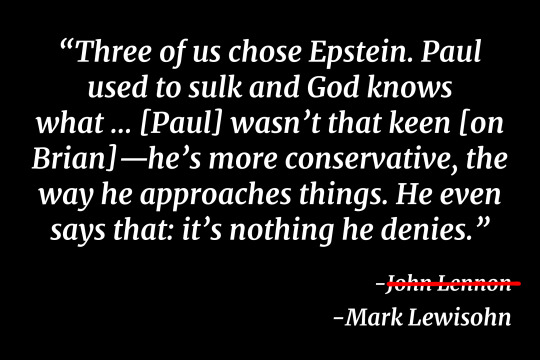
This is hella long, and that's because it's actually a full blog post. (In case you want it in a less monstrous form.)
A lot of people for a long time have put a lot of trust in Mark Lewisohn’s footnotes. Or at least in the fact of those footnotes. Because once you dig through them for any length of time you quickly discover that Mark Lewisohn’s footnotes hold secrets that would get him expelled from any undergraduate program. They reveal a “history” often contrived through a mass of Frankenquotes, ala carte creations, Lewisohn rephrased ‘paraphrases,’ and worse. For some parts of the narrative things aren’t too bad, yet in others monsters lurk around every corner. But this is not the sort of thing that’s graded on a curve, and it is past time to have a conversation about what standards should be accepted in Beatles’ scholarship.
Lewisohn lists his sources unlike most others. And his footnotes alone are more insightful than some other writers’ books. (Reddit, r/beatles)
I do not judge footnotes based on their insightfulness, nor do I want to single out a redditor, but I grabbed the comment because it’s an opinion that is widely shared and even accepted as canon. At least by people who have not combed those freakish footnotes. And while the pages of piled up sources do look fearsome en masse, a closer inspection reveals an offense to the truth, a threat to the record, and a blight on Beatles’ historiography.
“The rules for writing history are obvious. Who does not perceive that its chief law is never to dare say anything false, and never dare withhold anything true? The slightest suspicion of hatred or favor must be avoided. That such should be the foundations is known to all; the materials with which the building will be raised consist of facts and words.” –Cicero
A Look at Lewisohn’s Lab-created Frankenquotes
FIRST, WHAT ARE QUOTES? AND WHY ARE QUOTES?
Quotes are the soul and center of recorded—and recording— history.
And the rules around quotes and quotation marks are pretty simple. Most people, even if they’ve never written anything beyond a term paper, understand what quotation marks represent.
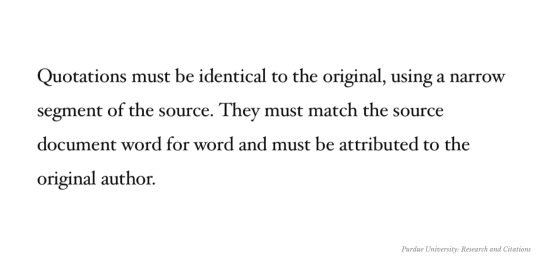
A set of quotation marks means, “This person said or wrote ‘these exact words’ at some given time.” You can smash a quote from two hours before or two years before right up against a separate quote to make your point—although it might get your grade lowered—but what you cannot do is take two different statements from two different times and make them seem like they are one statement.
When you put words inside one set of quotation marks you are stating, in black and white, that the identified person made this statement. That they said all those words together—or if you want to excise a reasonable part and use ellipses to represent that— as part of the same statement.
Look, combining two separate quotes that are not part of the same thought or topic is not a subjective issue. It is not an issue of controversy. Quotes are the bone marrow of written history. Quotes are the alpha and omega. In academic work or journalism they have to be, which makes sense as soon as you think about it. If it was cool for me to take a transcript and grab half a sentence from page 2 and half a sentence from page 17, push them together as if those words were spoken one after the other in a single thought, I bet I can manage to get those words to say almost anything I want.
Separate thoughts must be in two separate quotation marks. Separate. Somewhere between four sentences and a paragraph is widely accepted as the “two separate quotes” line, and there can be some ethical and technical wiggle room in a long rant by a person, but what makes all that subjective nonsense go out the window is if the quotes come from two separate questions. Or two separate days. That’s two quotes. Not hard.

Which again, makes sense if the point is conveying information to the reader and lessening the chance of a writer manipulating someone else’s words to express something that the person didn’t mean.
This is the contract inherent in a quote. These are the rules we all agree to and understand, and these are the reasons why. And there’s no reason to break them.
Why do you want me to believe that John said these two things at one time? What was wrong with what he did say?
THE FOUR MOST COMMON WAYS MARK LEWISOHN MAULS THE MEANING OF THE QUOTE:
The Basic Lewisohn Frankenquote 🧟♂️
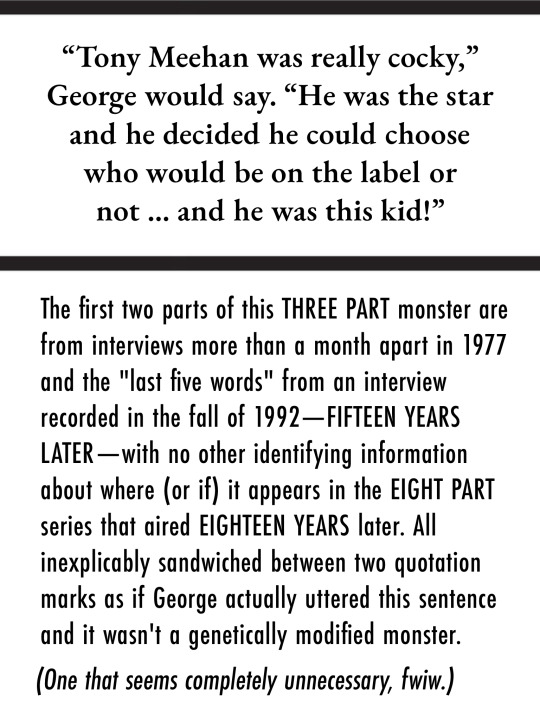
(“CONCLUDING FIVE WORDS FROM—” – I cannot even see the point of this THREE PART monster. Full footnote reads: 9) Author interview with Tony Meehan, September 6, 1995. (“I met George again in 1968 and for some reason he was harboring a grudge against me. He was very, very uptight about it—’You blocked us getting a recording contract …’ ”) First part of George quote from interview by Terry David Mulligan, The Great Canadian Gold Rush, CBC radio, May 30 and June 6, 1977; concluding five words from interview for The Beatles Anthology)
This three-headed monster attributed to George Harrison is a very dull little guy. Not particularly venomous. Just convenient, I guess. For whatever reason, Mark Lewisohn decided it was worth rummaging through the quote buffet until he collected enough pieces for George Harrison to say this thing. “…concluding five words from…” What are we even doing here? No, really. Please tell me.
And like a lot of the footnotes for these bespoke quotations, there are further problems. “[F]rom interview for Beatles Anthology”? An interview that aired? In one of the episodes? Can you narrow it down? I guess I’ll just have to listen very closely to them all and hope I don’t miss the five words.
But if we got bogged down in the sorts of trivial details that would immediately lose a college student a letter grade off a History 101 paper we would never get anywhere. We have to stick to the violent felonies.
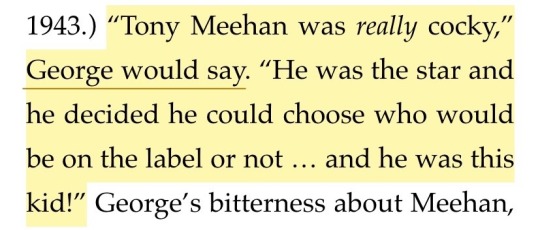
*Love the "George would say——" Uh, would he? Well, I guess after all that trouble you went to, he would now. It's really incredible how cavalier Lewisohn is about a Beatle's words.
These sorts of reconstituted, lab-engineered, made up “quotes” are shot throughout Tune In. “Quotes” made up of words from two, three, and even four sources, spoken months or often years apart.
Ala Carte Creations 🍱
It really is a buffet, and these ala carte creations come in all shapes and sizes. They might just be words that have been plucked up and glued back together to make something more useful to a particular narrative. (Ellipses or dash optional.)
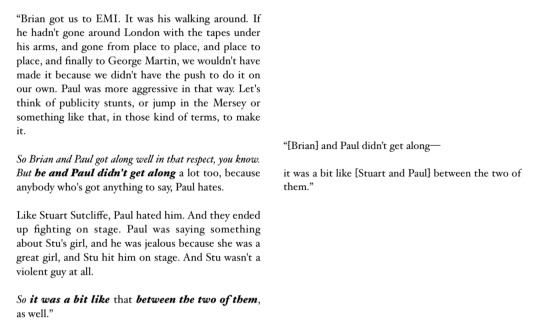
TUNE IN: “John saw a bigger picture, and it would be surprising if it wasn’t equally obvious, or made obvious, to Brian and George. He likened Paul’s enduring snag with Brian to his other long-standing difficulty: ‘[Brian] and Paul didn’t get along—it was a bit like [Stuart and Paul] between the two of them.’” (Footnote 37: Interview by Peter McCabe and Robert D. Schonfeld, September 1971)
Bonus 🍒 Phoebe's dramatic reading of John's original quote:
The Donut 🍩
Then there are a seemingly uncountable number of “quotes” with a sentence or three ripped out from the middle, but with zero representation that more words were ever there. (And in most of these particular deceptions, the simple representation of something excised (. . .) would make the quote fine. There are a lot of these, but they are also the easiest to fix.)

Chapter 10: “I was in a sort of blind rage for two years. [I was e]ither drunk or fighting. **It had been the same with other girlfriends I’d had.** There was something the matter with me.”
And then there are the true buffet bonanzas, words lifted and twisted beyond recognition until they say something brand spanking new.
However, John remembered Paul’s attitude to Brian being very different. John was always emphatic that Paul didn’t want Brian as the Beatles’ manager and presented obstacles to destabilize him, to make his job difficult … like turning up late for meetings. “Three of us chose Epstein. Paul used to sulk and God knows what … [Paul] wasn’t that keen [on Brian]—he’s more conservative, the way he approaches things. He even says that: it’s nothing he denies.”
The Lewisohn Remixes 🍸
And then there are the “paraphrases.” I couldn’t even begin to guess how many of these there are, and often they aren’t even paraphrases, but whole new Mark Lewisohn re-interpretations with quotation marks slapped around them. But if you don’t check, you probably won’t know, because like this Lewisohn rewrite of a well-known Mrs. Harrison quote, there’s a good chance you’ll recognize the bulk of it, making it less likely that you’ll catch the scalpel work excising Paul. And while I don’t want to get caught in the nooks and crannies of intent in an example like this one I have to say, just this once, that what has to be a purposeful excising of Paul to create a slightly new quote on one side, combined with a badly acted, bad faith—(or bad scholar)—“Where was Paul when John’s mom died?” on the other, is par for the course.
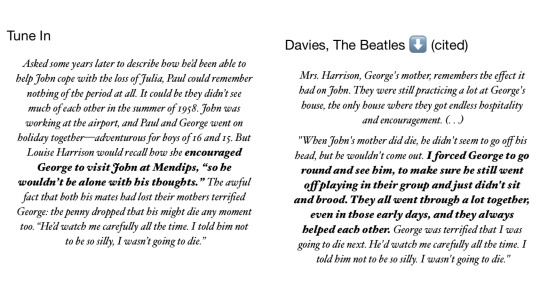
George Harrison’s mom’s made up Lewisohn rephrase which coincidentally removes Paul from the imagery.] ❦ LEWISOHN:“ Asked some years later to describe how he’d been able to help John cope with the loss of Julia, Paul could remember nothing of the period at all. It could be they didn’t see much of each other in the summer of 1958. John was working at the airport, and Paul and George went on holiday together—adventurous for boys of 16 and 15. But Louise Harrison would recall how she encouraged George to visit John at Mendips, “so he wouldn’t be alone with his thoughts.” ❦ DAVIES: “They were still practicing a lot at George’s house, the only house where they got endless hospitality and encouragement. . . . I forced George to go round and see him, to make sure he still went off playing in their group and just didn’t sit and brood. They all went through a lot together, even in those early days, and they always helped each other.”
Why do you have to slice and dice and reconstitute people’s words? No writer, and certainly no historian, should ever feel empowered to take words from a historical figure from two or three different places and topics and times, splice them together, and tell us, “Winston Churchill said this.” No he didn’t! Why are you so intent on changing the words of the people you’re writing about? What’s wrong with just using two different quotes?
You cannot take two or three quotes from two or three or even four separate statements, stick them between one set of quotation marks and say John or Paul or George or Joe Smith said this.
No they didn’t. They never said that. Why do you want me to think they did??
All these words are Abraham Lincoln’s, but this is not a Lincoln quote:
“Every man is said to have his peculiar ambition. Whether it be true or not, I can say for one that I have no other so great as that of — making a most discreditable exhibition of myself.”
(I kept it ridiculous, although I didn’t have to.)
But I want you, the reader, to be saying to yourself, “Okay, enough already. I get it!” Because in the last few days I have wandered too far into the weeds too many times and written far too many words detailing the multiplicity of ways Mr. Lewisohn does violence to each and every law of reporting historical facts, and could write many more. And I will post a more detailed list of the crimes against the quote that I am charging Mark Lewisohn with as we go forward, but I don’t think we need that now. The fact is that every fair-minded person knows what quotation marks represent, and there is no more fair-minded group of people than serious Beatles fans and scholars. And it is those fair-minded scholars who I want most to hear me. Whether you’ve written books or host a podcast or just know that you know a whole lot of stuff and take seriously your part of the trust in preserving the truth about The Beatles for us and future generations, it is you I am really talking to. My Cicero quoting-freaks. The ones who care about getting it right.
“The chief, the only, aim of style is to put facts in a clear light, with no concealment.”
- Lucian of Samosata
What footnotes can do, and what footnotes can’t.
You can list multiple sources in a single footnote. That’s not only fine, it’s correct. If I want to tell part of a story based on several sources, that often means several sources in a footnote. But not for one, single quote.
The problem isn’t the footnote, it’s the bioengineered quote on the page that you swept under a footnote hoping I wouldn’t notice.
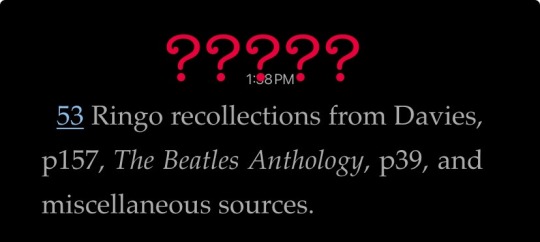
Which leads us to what a footnote is not. A footnote is not a post-hoc fixative for your textual sins. You cannot do whatever you want as long as you confess it in a footnote. A footnote is not a magic spell. A footnote is not the universally understood symbol for “I have my fingers crossed behind my back.” You cannot fix lies and misrepresentations in the footnotes. Footnotes aren’t for trying to chase down three different sources to match up which part of a manufactured “quote” someone said on which date. Footnotes are not the picture on the front of a puzzle box. I should not need to find corner pieces to figure out which of these George Harrison words were actually spoken together.
Footnotes are a truthful and independently verifiable record of primary sources. It’s that simple.
And taking Mark Lewisohn completely out of the picture for a moment, I feel sure we can all agree that neither John Lennon nor Paul McCartney nor George Harrison nor Ritchie Starkey would want anyone rearranging their words as if they were guitar chords. You wouldn’t take three-quarters of Penny Lane and one-quarter of Across the Universe, put them together and call it a Beatles‘ song. So don’t take three quarters of John to Jann Wenner and one-quarter of John to Lisa Robinson, put them together and call it a Beatle’s quote.
MY PERSONAL STANDARD IS THAT IF SOMEONE REPRESENTS, “A BEATLE SAID THIS,” IT BETTER DAMN WELL BE SOMETHING A BEATLE SAID.
None of the Beatles, dead or alive, would be cool with their words being taken out of context at all, let alone two or three different statements on god knows what being combined into one. This isn’t hard, though. Use two or three separate quotation marks, and don’t take statements out of context. Don’t mix and match their words, but don’t twist them, either. If a person said something, it is the historian’s duty to represent those words to the best of your ability, and then use them to tell a factual story focused on what you feel is important. Staying true to the original words and true to their meaning. If you can’t use those words without twisting them, then change your story to fit their words, not the other way around. If their statement helps tell the story your way, use it! For goodness sake, John Lennon said at least two opposing things about almost every topic on earth, so there should be enough to choose from without being deceptive. I actually want the truth. Don’t you?
Biography is story based around accurately represented, trustworthy and verifiable facts. And look, Beatles fans, whoever your favorite is: we are not going to get the truth about his history if we don’t learn to take these things seriously. Let’s have—if not high standards—at least the lowest generally accepted standards. In the mid-term we need a lot more Beatles scholars with a lot more points of view, and now—right now—we need experienced Beatles scholars to prioritize searching out and finding smart, interested people to mentor. And we simply must ensure that we aren’t allowing to solidify into stone “facts” that are not facts and statements no one ever made. I don’t think any honest Beatles fan—(which rounds up to all of them)—wants any question around that issue.
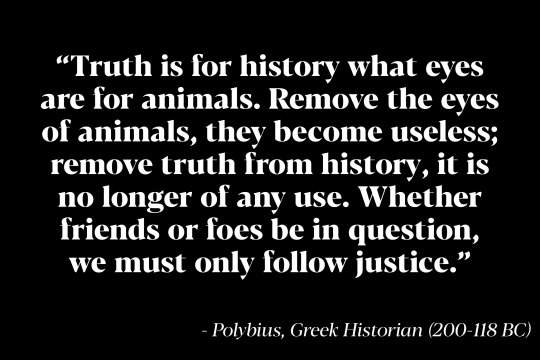
The record is the most important thing. Now, and always. This is not about John versus Paul. John versus Paul may live on always in our hearts, but for Beatles history, it’s the wrong question. I’d rather someone be up front about their loves, but in the end the focus should be on representing the primary facts in their most pristine form. Love who you love most, but place truth above all. Pristine facts. Pristine quotes. Nothing hidden. Nothing misrepresented.
Let the historical actors speak for themselves. That is their right.
And the historian’s duty.
NEXT, WE DISSECT A MONSTER.

Final note: I became frustrated and (maybe strangely) offended by Lewisohn's obscene pretenses in 2020, but my frustrations were nebulous and unfocused until this incredible AKOM series. I feel much better now. Angrier. But better. They worked their asses off. 🥂
#lewisohn#akom#the beatles#tune in#fine tuning#frankenquotes#lewisohn's monsters#historiography#paul mccartney#john lennon#george harrison#ringo starr#mark lewisohn#a beatle never said that#beatles#brian epstein#allen klein#Spotify
170 notes
·
View notes
Text

Things Fall Apart continues tomorrow
107 notes
·
View notes
Text
Today, I’d like to share one of Mark Lewisohn’s most entertaining fucked-up citations. This citation, Tune In 13-23, contains a rare example of Lewisohn almost saying something correct/insightful about Paul McCartney before hopelessly fumbling, as well as a far-less-rare example of Lewisohn correcting Paul on a bit of trivia while simultaneously mangling the source material. Here’s the text of the endnote itself:

In pink, Lewisohn lets us know that Paul, reflecting in the ‘90s on the events of 1960, did not correctly remember the name of the host. This is fine—I don’t take issue with Lewisohn correcting things the Beatles misremembered—but it’s very funny to see him correcting a bit of minutiae in the citation for two quotes he altered or misrepresented.
In yellow, we have what seems, on the surface, to be an actual insight about Paul: “Paul sometimes says ‘we’ in interviews when he means ‘I.’” This isn’t a paradigm-bending revelation—I’m sure my mutuals are all very aware of this habit of Paul’s—but it’s an insight nonetheless.
Or it would be, if this wasn’t said in relation to a quote where Paul clearly means himself and another person. So close, Mark! From Tune In:

Teenage Paul, out of his depth at a college party, pretends to be a singing Frenchman, creating ‘Michelle’ in the process. The first quote, the one where Lewisohn asserts Paul is using “we” in the singular sense, is from the Anthology (2000, p.198):

Do y’all see the problem here? “It was very sophisticated for me and George, so we were trying to hang in there and pretend we knew what was going on.” Emphasis added by me, just in case Mr. Lewisohn is reading and needs a little help.
This is not Paul saying “we” but meaning “I.” This is Paul explicitly stating how he and George felt. And like?????? The “clarification” Lewisohn provides in the endnote is completely unnecessary to begin with. There’s no reason to say Paul means just-him in this quote, unless Lewisohn is worried John will get lumped in with Paul’s loser teenager behavior. In that case, instead of lying and saying Paul actually meant just-Paul here, why not mention that George was at the party and out of his depth as well? Why do this??????
Onto Many Years From Now (1997):

The quote itself isn’t too altered. Lewisohn fails to mark the omission after “It was” with an ellipsis, but that’s small potatoes for him. The Irritating thing here was brought to my attention be @mythserene: even though Paul mentions three specific influences on his wannabe French style (Sacha Distel, Juliette Greco, and Maurice Chevalier), Lewisohn invokes an entirely different Frenchman, Jacques Brel.
With Lewisohn’s phrasing, he’s not incorrect. If Paul said “Joey Fatone and Justin Timberlake were huge influences on my choice to get frosted tips in 2001,” it wouldn’t be wrong to describe his appearance as “Lance Bass-esque.” But if you’re writing a musician’s biography, and that musician has named specific influences on their music or presentation, why would you not invoke those influences when the opportunity arises? Isn’t it more work—and less informative—to dig up some fourth French guy to slot in here instead?
Lewisohn thinks it’s worth the readers time to know that Paul forgot who hosted a party he attended as a teenager, at the same time putting in effort to avoid mentioning Paul’s stated influences.
68 notes
·
View notes
Text
‘John fascinated me the most because he exuded rocker,’ says Jürgen [Vollmer]. ‘I was a little disappointed when later I got to know him because he was a softie, but he carried off the rocker image perfectly. At the time, though, I never felt comfortable in his presence.’
Tune In by Mark Lewisohn.
Love that he was uncomfortable, until he was disappointed.
99 notes
·
View notes
Text
The chapter of Royston Ellis meeting the Beatles is so wild.
He first hits on George at the Jacaranda. George responds to this with a casual “oh, you’d love my friends” and brings him to Gambier Terrace:
Also dropping into the Gambier Terrace pit was a special guest, Royston Ellis, “King of the Beatniks.” The bearded bard, who featured in TV documentaries and press articles whenever an offbeat teenage angle was needed, was in Liverpool to read his poetry at the university on June 24/25, and he swiftly found himself drawn into the Beatles’ company. The conduit was George, who (with nothing else to do while John, Stu and Paul were in school) was hanging around the Jac when the wandering coffee-bar poet traipsed in, drawn by hip radar to “the happening place.” Avowedly “trying everything,” Ellis was an active bisexual in this period of his life and he took an immediate fancy to George: “He looked fabulous with his long hair and matelot-style striped T-shirt, very modern, which is why I deliberately spoke to him. I was nineteen and he was seventeen and we clicked right away.”15
George took Ellis, his typewriter and his duffel bag back to Gambier Terrace to meet John and Stu. A rapport was quickly established and Ellis was invited to “crash” for a few days—yet another occupant for the filthy back room.
Then Ellis hits it off with John and Stu and wants them as a backing band:
Ellis says he developed a particular rapport with John and Stuart and that they discussed poetry, art and London. When he left, they spoke of doing it again sometime: “We were talking about how I wanted a band to come to London and back me on my Rocketry performances, and they were thrilled at the idea.” Art school studies finished the following Friday, July 1, marking the end of Stu’s fourth year and John’s third and last because the college was waving him goodbye. The exam results, when they came through on August 1, were just as expected: John failed and was out, Stuart passed the NDD, for which he received a certificate. The option was there for him to do a fifth year and attain the highest available qualification, the Art Teacher’s Diploma (ATD), akin to a degree and entitling him to become a teacher … but both he and John were pondering a period as prospectors, and doing something again with Ellis was a definite possibility.
So much so, Ellis is responsible for the first* two mentions of the band in the newspaper:
As for Ellis, so much was he enthused by the possibility of appearing with them again that he soon got the Beatles their first mention in a music paper. It was the July 9 edition of Record and Show Mirror, where a supercilious little article about “the bearded sage of the coffee bars” ended “he’s thinking of bringing down to London a Liverpool group which he considers is most in accord with his poetry. Name of the group? ‘The Beetles’”
….A born publicist, Royston Ellis knew how to manipulate a follow-up, writing a letter for publication that clarified a point in the first. He expressed his intention to find a group that would join him on TV appearances with Bert Weedon and the Shadows, and reiterated, “For some time I have been searching for a group to use regularly, and I feel that the ‘Beetles’ (most of them are Liverpool ex-art students) fill the bill.”
John and Stu decide to go to London on their own to join Ellis…but then chicken out:
By July 10, at the end of his three-year art school vacation, John had arrived at a key decision in his life: he would try to earn his living from the guitar. “I became a professional musician the day I got a red letter from the art college saying ‘Don’t bother coming back next September,’ ” he later said.31 Cyn would remember, “John decided that this [music] was very definitely the life for him. All the ideas that everyone else had for him of making an impact on the art world faded into the back of beyond with incredible rapidity, and with almost no regret at all. Aunt Mimi was distraught. Her view of his future couldn’t have been blacker at that time.”32
These events coinciding, it seems John and Stu decided to head south and hang out with Royston Ellis. Allan Williams is emphatic on the matter: he says John and Stu “split the Beatles and went down to London.”33 Norman Chapman would remember Stu asking him for a lift through the Mersey Tunnel one day so he (or he and John) could hitchhike to London—“They wanted to go down to London and become involved in this poetry-music scene.” Beat poets led a nomadic life by definition. Ellis lived for periods in all sorts of places, but his main base was still his parents’ house, at 31 Clonard Way, Hatch End, Pinner, Middlesex, a pleasant detached villa with the name Denecroft. This was the address he gave John while staying at Gambier Terrace. When Ellis arrived home one day his mother said he’d missed a visit from his “beatnik friends from Liverpool.” He never knew how many or who had come, but—as insane as it appears—John and Stu (and/or as Ellis always thought—hoped—George) had hitched the best part of two hundred miles, taken the trouble of locating his house in leafy Metroland, not stayed or left a message and then gone home again, never returning or making further contact. It makes no sense, but there it sits, illogical and incomplete.
Allan Williams remembers them being “back in Liverpool within a week, because it didn’t work out,” at which point the Beatles “reformed” as if they’d never been away. With bookings only every Saturday, it’s conceivable they did all this without missing one, and perhaps that was always the intention. However, while three independent witnesses (Ellis, Williams and Chapman) all remember something happening, none of the Beatles ever mentioned it—though in their interviews they talked with candor about everything. So it must remain in doubt, an intriguing puzzle unlikely to be solved.
There are two additional curiosities that may or may not be incidental. One is that, in the last days of July, a group of Liverpool art school students, apparently including John and Stu, went to London (or tried to go) to see a Picasso exhibition at the Tate Gallery. Second, and most fascinatingly, a set of photographs taken at this very time (mid-July 1960) in Stu and John’s studio-bedroom-slum at 3 Gambier Terrace includes several people they knew but not John and Stu themselves—perhaps because they were on the Hatch End trip. It was published on July 24 in the national Sunday rag the People in a sensation-splash headlined THIS IS THE BEATNIK HORROR. It’s as if a man on a flaming pie was pointing down at Flat 3, Hillary Mansions, Gambier Terrace, Liverpool 1. In six months, three Beatles moved in and the fourth was hanging out, the nation’s best-known beat poet had come here to get them high, and now, when a Fleet Street journalist and photographer were looking to substantiate a load of old tosh about dirty beatniks—reportage that could have been cooked up anywhere in the country—they landed in Stu and John’s room.34
Though hugely amusing, the feature had one unfortunate side-effect: because the address was given (a “three-roomed flat in decaying Gambier Terrace in Liverpool”) and some of the occupants (“well-educated youngsters”) were named, the landlord gave the tenant, Rod Murray, notice to quit. On August 15, everyone—Rod, Diz, Ducky, Stuart, John and sundry other bodies who’d joined them—would be out on the street.
—Mark Lewisohn’s Tune In, Ch 15 (May 31–Aug 15, 1960)
And Lewisohn is just like yup nothing to see.
So what the hell happened here? Was it just a school trip? Or was it a deliberate split?
#royston ellis#beat poetry#beatniks#tune in#1960#early liverpool#bug mysteries#i think about this once a week and just found the bit again#mine#mark lewisohn#reading tune in#prebugs#*i think they may have found an earlier mention since tune in printing#i have a june newspaper clip date in my timeline#john and stu#young george#june 1960#queer bugs#reading riding so high#joe mentions the dates of royston’s liverpool university appearance#june 24 1960 and davies says the first beetles mention in the newspaper is june 11#so theres some conflict there when was the first#just learned royston ellis died earlier this year#but kerouac website writers reached him in 2020 and he still claimed they got the BEAT ideat in the name from him#theyve got a clipping from june 5 with silver beetles#but lewisohn references a june 2 clipping with the A (beatles)#so thats too early for royston maybe they were deciding and flipflopping he helped settle on one i can see that#lalala i cant read its first mention in a music paper rather than a general newspaper
102 notes
·
View notes
Text
“[August 1960, the morning of the Beatles' departure for Hamburg] In Allerton, at 20 Forthlin Road, Jim Mac ensured his son had enough cod liver oil capsules for two months, and enquired (as he did most mornings) whether the boy’s bowels had moved, then he gave him an Englishman’s pep talk, making him promise to be a good lad, stay out of trouble, eat proper meals and write often.”
– Mark Lewisohn in The Beatles – All These Years – Extended Edition: Volume One: Tune In (Chapter 19)
110 notes
·
View notes
Text

buckhead1111
86 notes
·
View notes
Text
Trump just claimed to have taken "a bullet to the head"
8 notes
·
View notes
Text
strawberry mini ringo


#artists on tumblr#the beatles#fanart#beginner artist#ringo starr#silly little guy#mini ringo#Let me take you down#'Cause I'm going to strawberry fields#Nothing is real#And nothing to get hung about#Strawberry fields forever#Living is easy with eyes closed#Misunderstanding all you see#It's getting hard to be someone#but it all works out#It doesn't matter much to me#No one I think is in my tree#I mean#it must be high or low#That is#you can't#you know#tune in#but it's alright#I think it's not too bad#Always#no sometimes#think it's me#But you know
7 notes
·
View notes
Text
When the Beatles returned to Liverpool in December 1960 Stuart Sutcliffe had stayed on in Hamburg. He finally came home around the 15 January 1961 and took his place in the group a day or so later, ready to play the upcoming gigs at Lathom Hall.
The Beatles had all witnessed violence at venues in both Liverpool and Hamburg but the unfamiliar north end of the city around Seaforth was particularly rough. A lot of the Teds in the audience were likely to have worked on the local docks during the day and seemed to have a strong territorial mentality so the Beatles were often looking over their shoulders after a gig in case one of them had said the wrong thing or looked at the wrong girl, or John had done one of his great big winks, which delivered with just the right amount of sarcasm and provocation would really wind the Teds up.
They were right to be wary. Neil Aspinall, a friend of Pete Best who was just starting to drive The Beatles to gigs, and would eventually become their road manager would recall an incident at Lathom Hall in January 1961 where "two troublemakers followed Stu Sutcliffe into the dressing-room muttering things like ‘Get your hair cut, girl!’ John and Pete saw this and went after them. A fight broke out and John broke his little finger…It set crooked and never straightened.”
Pete Best: “When we’d done our session and came off, we changed, which didn’t take an awful lot of time because we basically played in what we stood up in. Stu went out, followed by John and myself.
These lads started a fight with Stu after picking on him. We got to know about it because some people ran back to the side of the stage where we had come from and said, ‘Stu’s getting the living daylights knocked out of him. So John and I dashed out. We threw a couple of punches, sorted things out and pulled Stu back in again. The fact that John and I had pitched in and got involved made (the teds) feel a certain amount of respect for us….as a result of the fight John broke a little finger. He still managed to play for a couple of gigs after that. He hadn’t complained …the next time we saw him he had a splint on it.
Neil had gone home to his studies while the Beatles were playing but when he returned to pick them up they told him "there's been a fight in the bogs". John had broken a finger, Pete had a black eye, Paul had been dancing around and Stuart had been kicked in the head. Apparently Stu had been trapped in the toilets by some Teds because their girls had been screaming, and John had probably done one of his big f*****g winks. (Tune In)

#:(#The Beatles#Stuart Sutcliffe#John Lennon#Pete Best#Neil Aspinall#quotes#John#Stuart#'John had broken a finger Pete had a black eye Paul had been dancing around and Stuart had been kicked in the head'#why'd they have to do Paul like that#Tune In#‘Get your hair cut girl!’ :(
59 notes
·
View notes
Text
Lewisohn has definitely gotten weirder over the years.
Some Ivan Vaughn weirdness from Lewisohn's latest, very weird, interview that made me think about Phoebe and Daphne and all the weirdness they caught in Fine Tuning.
Lewisohn says John and Ivan's parental figures introduced them in the hope that they might play together, but also Ivan went to Liverpool Institute—the superior school to Quarry Bank—because Ivan's mum didn't want him to play with John. And Paul and Ivan might not have met (despite both being at the Inny) had they not had the same birthday? I must be missing some bit of trivia because what does that mean??
(transcription below)
John and Paul “met because they had a mutual friend.”
That mutual friend was the friend of John because he lived in the house behind John. And in those days parents, or parent figures—John was raised by his aunt—but if there were other little boys in the neighborhood, you would be introduced in the hope that you might play together. I don't know that that happens any more, but it did happen in those days. And in Paul's case, because Paul had gone to a particular school, um, this friend-- this mutual friend-- this friend of John's, Ivan, he was at the school, the same as Paul. And they had the same birthday, so they'd been introduced to one another. If they hadn't have had the same birthday they may not have even been-- ever been met. So, and it's-- and also, the reason that Ivan was at that school and not the more local one was his mother had said “you're not going to the same school as John Lennon” 'cause he was the kind of boy that other parents always kept their children away from if possible.
Daphne and Phoebe definitely caught that Lewisohn invented the idea that Ivan would have gone to Quarry Bank but for John being such a bad boy. (They didn't say “invented,” but they knew it, and after four months of being a Lewisohn Sherlock Holmes I'll say it. He made it up. There is no support for it outside Lewisohn's delusional mind.)
AKOM 📍
#akom#hey ladies#ivan vaughn#fine tuning#lewisohn weirdness#lewisohn#lewisohn interview#fanboy fiction#the beatles#tune in#john lennon#paul mccartney#beatles#mark lewisohn#Spotify
75 notes
·
View notes
Note
What about 'Ask Your Mother'?
Oh I am so excited for this one! Another Dewey centric story! Basically the poor kid has questions and NONE of the adults wanna give him the answers for some reason
Here’s a snippet from the beginning:

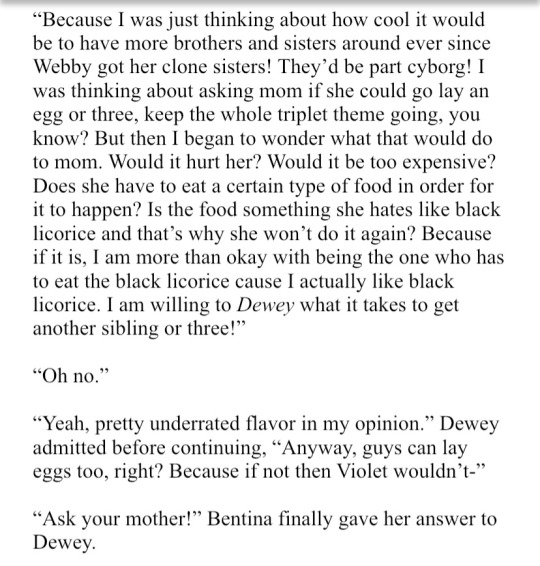
#the journey I’m gonna make this poor kid on#will Dewey ever get the answers to his questions?#tune in#wip ask game#korkorali#writebackatya
11 notes
·
View notes
Text
This is a fun collection of quotes from the Let It Be Beatles Interview with Mark Lewisohn conducted on August 20, 2018. This is mostly for @mythserene's enjoyment, but it's also a fun lil supplement to this comment by @talking-perfectly-loud on a post by @anotherkindofmindpod, which includes some revealing, deeply salty quotes by Lewisohn from an episode of Nothing Is Real.
The below soundbites focus on Lewisohn's feelings towards the Harrison estate, particularly Olivia, though Lewisohn also lets us know that he considered suing George at one point. Italics used to indicate tone; bold font is added emphasis by me.
This is from ~1hr8min into the interview, after a discussion of Mal Evans diaries. Here's a partial transcript:
"No, no, Olivia Harrison doesn't want anything to do with me at all. Yeah, so it's very frustrating because I just want to make the history better and better and better and more and more correct, especially more and more correct in terms of balance on all four Beatles, but whatever."
This is a longer clip (6:26) from ~1hr23min in the original interview. They're discussing Lewisohn's falling out with Apple/the Beatles/George in particularly, which came about because he was falsely accused of bootlegging, or something like that. He's told a few variations of this story.
The first 3ish minutes give some flavor and backstory. Some choice quotes (they're at about 2:50, 4:35, and 5:42 in this clip):
“To the day he died, George blocked me, and Olivia blocks me in George’s name, and so it still carries on.”
“I’ve never, ever leaked, and that was why it was so galling to be accused of being a bootlegger. George Harrison accused me of being a bootlegger to my face in front of a whole film crew, the bastard. I mean, really. A horrible, horrible thing to do. I really should have done him for slander, and in fact at one point I was tempted, believe it or not. Because, you know, I’m a professional, I’m on a shoot, I’ve got a whole unit with me, and he’s accusing me of being a bootlegger in front of everybody, which was- he had no evidence for because there wasn’t any, but that didn’t matter. He was accusing me without evidence, and it was wrong, and um, you just have to put up with these things. These people, they can get away with murder. Celebrities, you know?”
Lest we think George was wilding out solely because of the bootlegging, Lewisohn helpfully clarifies that it was also Paul's Fault:
“The irony of that was that I actually had started off really well with George. I knew George from ’87, personally, and we’d had nice times, and it was- one of the things that flipped it was when I began working regularly for Paul.”
This was the part of the podcast that really took me aback, from around the 1hr43min mark. There's some chatter about Let It Be (the film), and then Lewisohn goes off once again about Olivia Harrison. He's quite impassioned, and then seems to make a conscious effort to talk himself down.
“I don’t know Olivia Harrison. I’ve never met her, which makes her- just- [angry] blocking of everything I do so ridiculous, because she doesn’t even know me. But if, as it would appear, she’s taken it upon herself to perpetuate George’s wishes, which is something that you might expect a spouse to do when their partner’s died, if the partner says, ‘Don’t ever allow this’, then she would take it as her duty not to allow it.”
This is followed by some hedging.
There are several other choice tidbits in this two hour Lewisohn marathon, but Olivia Harrison was foremost in his mind. But don't worry, guys, he's not biased!
#george harrison's last words were fuck mark lewisohn. hare krishna#CONFIRMED#olivia harrison get behind me#next substantiative post coming soon#just a bit of fun for now~#mark lewisohn#tune in#lewi-sins
47 notes
·
View notes
Text
Paul would claim, ‘I wasn’t brilliant at school, I was trouble at school. I used to get caned every frigging day. I was the class naughty boy . I was the one with long hair. I was the equivalent of John, in my school. And George was the other.’
Interview by Richard Williams, for The Times, 16 December 1981. Quoted in Tune In by Mark Lewisohn.
Paul 'No Seriously, I was a Rebel!' McCartney
123 notes
·
View notes
Text
“Paul was also still getting together with John to write songs. Though their productivity seems to have slowed by autumn 1958, their ideas were merely branching out. Around October, perhaps during the half-term week at the end of the month, Paul made another visit to Mendips (‘John! Your little friend’s here again’) and was happy to find John typing a new poem. Actually, this one wasn’t a poem, it was more of a lunatic short story. Paul took one look and loved the wordplay, the typical Lennon phrases like ‘a cup of teeth’ and ‘in the early owls of the morecombe’. John called it ‘On Safairy With Whide Hunter’ and its origin was clear: it was from White Hunter, a TV adventure serial being shown by Granada, weekly yarns about ‘the surest and fastest shot in Africa’, overblown scripts brimming in bwana.
John let Paul join in and the satire became a way-out Lennon-McCartney Original.* Though some lines are characteristically John’s, especially the trademark renaming of the lead character every time he was mentioned (Whide Hunter is also Wipe Hudnose, Whide Hungry, Wheat Hoover and Whit Monday), others are probably Paul’s (‘Could be the Flying Docker on a case’ and also ‘No! but mable next week it will be my turn to beat the bus now standing at platforbe nine’). One imagines the two of them in stitches when they came up with lines like ‘All too soon they reached a cleaner in the jumble and set up cramp’. Another sentence – ‘Jumble Jim, whom shall remain nameless, was slowly but slowly asking his way through the underpants’ – could well have been a reference to Jim McCartney.
*Or as John put it, when it was part of a bestselling book six years later, ‘Written in conjugal with Paul’.”
– Mark Lewisohn in The Beatles – All These Years – Extended Edition: Volume One: Tune In (Chapter 14)
#I was looking through my ebook version of Tune In to check something for my fic#and stumbled across this#and it was so delightful i HAD to share#tune in#john#paul#jp#58#lennon-mccartney#ref
101 notes
·
View notes